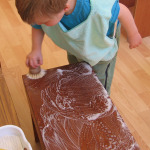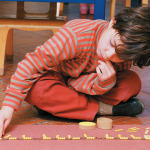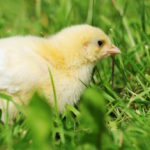“What’s that? What’s that?” two-year-old Joshua asked about every new person, place, item or sound encountered on a shopping excursion. Tim and Marcy, Joshua’s parents, began to realize that their chances for a conversation or a cup of coffee on this outing were futile. Joshua’s behavior made it truly “out of the question”. Joshua fussed […]
Category Archive:
Brain development
The Child Has Time Sensitive Opportunities For Growth
“No.” If we could have one word to associate with a two-year-old, it would be the word “no”. When a two-year-old realizes that he or she has the power to decide by saying a simple yes or no, we can observe a time-sensitive period in a child’s development. Establishing independence around age two, and exerting […]
TV Or Not TV, Is That The Question?
All man’s miseries derive from not being able to sit quietly in a room alone. Blaise Pascal (1623 -1662) “I can tell you exactly the year that my students changed,” my college professor told our class in the 1970’s. “I’d ask a question and nobody made any attempt to answer it. They thought they were […]
Help with Stuttering
“Kate has started to stutter. What should I do? How can I help her?” Doug, father to three-year-old Kate, asked. As we develop spoken language, stuttering is a symptom of expressive skills lagging behind receptive language skills. If we think about receptive language being our reservoir of words and understanding, and expressive language as the […]
Allowing Opportunities For Movement
A kid’s got to move. Observing a few minutes at a playground will attest to that. You don’t see children sitting around if they have the chance to run, jump, climb, or skip. Children are in a sensitive period of development for movement from birth to about age five-and-a-half. Around age four-and-a-half, children have a […]
The Truth About Tattle Tales
“Don’t be a tattle tale,” Jessica told her seven-year-old son, Eric. “But, Mom, it’s not fair. Tom threw the ball over the fence. He should get in trouble,” Eric said. “Your brother will have to figure out how to get his ball back. That’s the trouble he’s in,” Jessica told Eric. “But, Mom!” Eric replied. […]
Sensitive Periods: Three Period Lesson Aids Sensory Development
Between the ages of birth to four-and-a-half, children are in a sensitive period for refining their senses. Children at this age are capable of learning to discern hundreds of qualities of the things around them. Perfect pitch is acquired before the age of six. Too often adults stop giving information after certain basics are mastered. […]
The Best Years For Learning
During the ages of six to twelve years, humans are in a developmental period of robust health between childhood illnesses and puberty. This healthiness supports the intellectual development of the person. During these years, we are most receptive to learning. Later, learning will require more effort and concentration. During the child’s years of great intellectual […]
Using A Sense Of Humor
“Knock. Knock.” “Why did the chicken cross the road?” “Why did the elephant paint its toenails red?” Answer: Because they turned six-years-old. Spend a few hours with a six or seven-year-old and you might hear a joke. Or two. If you are lucky they’ll make sense. Many times I’ve sat at a table full of […]
Beware The Age Of Rudeness
“Ever since Jill started first grade, she’s become louder, messier, and not as kind as she was in kindergarten. I think her first grade classroom must be the reason she is the way she is,” Jill’s mother, Paula, said. Susan, a former kindergarten and first-grade teacher, smiled. “Paula, I heard this every year. What’s happening […]










